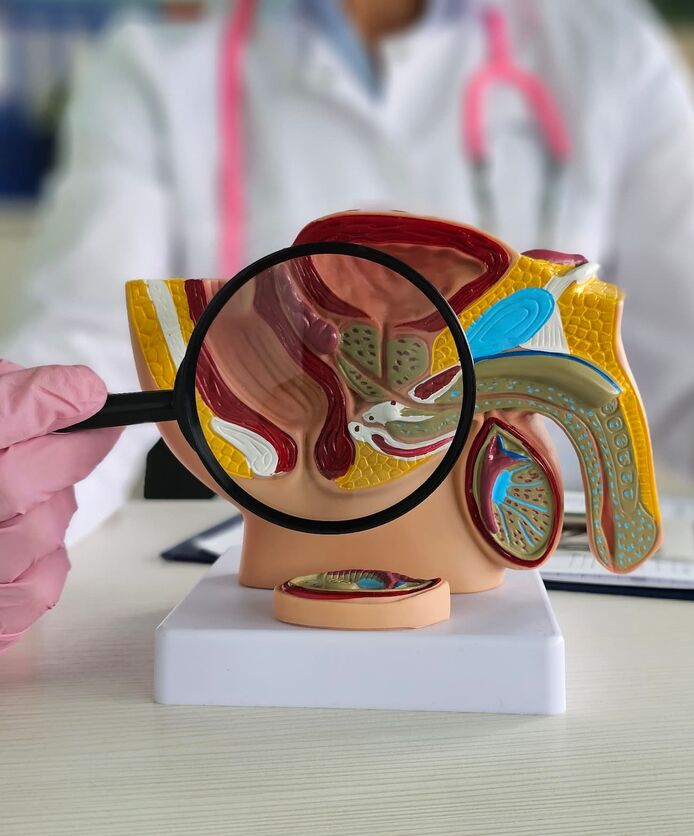Survey Says! Lifting the Covers on Sexual Health

According to this House of Commons Committee report, there has been a recent increase in levels of sexually transmitted infections (STIs) in the UK, due to a number of factors including stigma around the topic and lack of education.
In response to the report, Sobia Qasim, Superintendent Pharmacist at Curely, said, "The 2024 report from the House of Commons Women and Equalities Committee highlights the urgent need for improved sexual health education and better access to services, particularly for young people. The rise in STIs is alarming, and the report's recommendations, including those aimed at enhancing the role of online providers in delivering accurate information, are crucial steps toward addressing this public health issue. As healthcare providers, we must support these initiatives and work to reduce the stigma that prevents many from seeking timely care. Strengthening online resources and ensuring they are trustworthy is vital in today's digital age, where many individuals first turn to the internet for advice on sexual health."
By talking about sexual health openly and starting conversations around it, we can help to promote safe sex and destigmatise the topic. We conducted a survey of 600 adults to find out more about what the general public think by asking them questions about sex education, perception of sexual health, sexual health conditions, STIs and contraception.
In this article, we’ll discuss our findings to give a clearer picture of current attitudes towards sexual health.
Sex Education

Although sex education is taught at schools up and down the country, it can often be fairly basic or rushed as more priority is given to subjects pupils will be examined on. In our survey, we asked whether people thought the sex education they received in school prepared them well for real-life situations. While just over 46% said it covered the basics, almost 20% responded that they felt ‘not at all’ prepared, suggesting that most sex education in schools isn’t enough. This matches with research done by the Department of Education in 2021 where “many [young people] said their PSHE teaching at school was so poor that they learned most of it online”.
But is the internet a reliable resource? When surveying people, we asked if the internet had made it harder or easier to access accurate information about sexual health. Most opted for easier, yet 57% of people also agreed that the internet spreads a lot of misinformation. Interestingly, over 27% of people said the internet offers access to more reliable sources than non-digital information formats. While the internet can provide useful information, it isn’t regulated for quality or accuracy, making it easier for false messaging to circulate, especially through social media platforms such as TikTok and X (formerly known as Twitter).
It is therefore important that young people are given accurate, thorough sex education at school so they know the risks associated with sex and what they can do to prevent them.
Perception

Looking after your sexual health is important. However, many people feel embarrassed or ashamed to seek the advice they need, especially as it involves opening up about a very
personal issue. With the added stigma around sexual health, in particular STIs, many feel awkward talking about it, even to a medical professional.
In our survey, we asked whether people felt judged by a healthcare provider when talking about their sexual health. While over 50% responded that they didn’t, almost 30% said they had never discussed the topic with a healthcare provider. Although part of the reason for this might be that they haven’t had any sexual health concerns, it does bring up the question of whether people are hesitant to talk about sexual health for fear of being judged.
Next, we asked whether they had ever avoided talking about sexual health with their doctor because they felt embarrassed. While just over 36% of people answered no, just under 30% answered that they had done so once or twice. This means that nearly a third of people surveyed have avoided the topic due to embarrassment at some point in their lives.
From our survey, it’s clear that for the most part when people do talk to healthcare professionals about sexual health concerns, they don’t feel judged. However, the issue seems to be a hesitance to bring it up in the first place, for fear of how they may be perceived. Reducing stigma around sexual health by creating environments where people feel comfortable to talk about it is therefore important. This could start in schools so young people grow up feeling able to discuss their sexual health with a medical professional.
Conditions

As well as feeling embarrassed talking about sexual health to medical professionals, some people can also feel awkward bringing it up with their sexual partners. Some conditions can require ongoing treatment which can put strain on relationships. In fact, 32% of people surveyed said they wouldn’t engage in a long-term relationship with someone having treatment for a sexual health issue. A further 30% said they would but would have some reservations.
Two common conditions that can affect men are erectile dysfunction and premature ejaculation. Erectile dysfunction occurs when a man can’t get or keep an erection long enough to have sex, while premature ejaculation is when a man ejaculates earlier than he or his partner wishes. Both these conditions can impact a man’s self-confidence and sense of masculinity. In our survey, seven out of 10 people agreed there was stigma surrounding erectile dysfunction, while six in 10 people gave embarrassment and stigma as the biggest barrier to someone seeking help for premature ejaculation.
However, both these conditions are very common and can be caused by a number of issues such as stress, fatigue or hormonal issues. If your partner suffers from either of these conditions, it’s important to support them and create a safe space for them to talk about it so they can get the treatment they need.
STIs

At the moment, STIs are on the rise, especially among young people aged 15 to 24. This is a cause for concern as STIs such as genital herpes, genital warts, gonorrhoea and syphilis can have long-term complications and health problems. Much like other sexual health conditions, people find it hard to talk openly about STIs. A whopping 85% of people we surveyed agreed there was a lot of stigma around STIs. If this leads to people not getting tested, it could have a significant negative impact on their life.
Additionally, when you have sexual relations with someone else, it’s also important to consider their sexual health. If you don’t tell them about any history with STIs, it could be dangerous for them as well. In our survey, we asked if the participant had ever slept with someone without knowing their STI status. Almost half answered yes.
While it can feel awkward to discuss STIs with a sexual partner, it is vital that you do so to look after both their and your own sexual health. If you are sexually active, it is important to get tested regularly for STIs and seek medical attention if you’re at all concerned.
Contraception


To stay safe during sex, it’s important to use contraception, in particular barrier forms of contraception such as condoms. The UK Health Security Agency emphasises that “condomless sex is a key risk factor for STI acquisition, and changes in condom use have been widely
reported”, which could explain the spike in STIs. They are calling on the Government to promote the benefits of condom use to ensure safer sex.
In our survey, the two most used forms of contraception were condoms at 37% and birth control pills at 21%. However, when asked how often they used contraception during sex, only 28% responded every single time. The other 72% was split between most of the time, never, rarely and occasionally.
There are a lot of factors that prevent people from using contraception. When we asked the biggest concern, 32% chose potential side effects and 21% effectiveness in preventing pregnancy. These are both important factors to consider and if you do have any concerns, make sure to speak to a healthcare professional who can offer advice and assurance.
While methods such as birth control pills and IUDs can be used to prevent pregnancy, they won’t protect you from STIs. In most cases of male/female sexual relationships, the responsibility of STI prevention falls to the man wearing a condom. Nearly 59% of people surveyed agreed with this, saying that men need to take more responsibility for birth control during sex.
As well as the standard condom, there are also internal (female) condoms which can be inserted into the vagina or anus before having sex. This empowers those on the receiving end of sexual acts by giving them greater control over STI prevention measures, as well as being the primary form of STI-preventing barrier contraception available to women or those assigned female at birth in same-sex relationships. Additionally, internal condoms are a valuable tool when it comes to preventing STI exposure during oral sex. As this type of condom is less well-known, it is important to spread awareness about it to reduce the rise in STIs and keep everyone protected when having sexual relations.
According to our research, the two biggest barriers to people receiving the sexual health advice and help they need are feelings of shame or embarrassment. This could be due to a lack of open conversation around the topic, whether that’s in school, work or social situations.
Qasim states "Sexual health is a critical aspect of overall well-being, yet it's an area where stigma and misinformation continue to pose significant barriers to access and education. The recent rise in STIs, as highlighted by the House of Commons Committee report, underscores the need for comprehensive sexual health education and open conversations. At Curely, we believe that everyone should have access to accurate information and the confidence to seek help without fear of judgement. Encouraging open dialogue and breaking down these stigmas are essential steps toward improving sexual health outcomes across the UK."
There are safe spaces to talk about any sexual health issues including STIs. Healthcare professionals are there to support you in getting the help you need so if you have any concerns about your sexual health, don’t hesitate to get in contact with your doctor or local sexual health clinic.
Sources:
- https://www.nhs.uk/conditions/ejaculation-problems/
- https://www.brook.org.uk/your-life/stis-and-stigma/
- https://publications.parliament.uk/pa/cm5804/cmselect/cmwomeq/463/report.html
- https://www.nhs.uk/conditions/erection-problems-erectile-dysfunction/
- https://www.nhs.uk/contraception/methods-of-contraception/internal-condoms/

Which contraceptive pill is best?

How to get rid of flu

What causes erectile dysfunction?

What are the symptoms of flu?

How to delay your period

